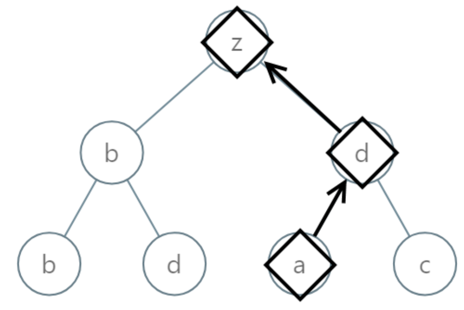Smallest string from leaf node
You are given the root of a binary tree where each node has a value in the range [0, 25] representing the letters ‘a’ to ‘z’.
Return the lexicographically smallest string that starts at a leaf of this tree and ends at the root.
As a reminder, any shorter prefix of a string is lexicographically smaller.
For example, “ab” is lexicographically smaller than “aba”. A leaf of a node is a node that has no children.

class TreeNode:
def __init__(self, val=0, left=None, right=None):
self.val = val
self.left = left
self.right = right
def smallestFromLeaf(root):
def dfs(node, path):
if not node:
return
# Add current node's value to the path
path.append(chr(ord('a') + node.val)) # ord('a')=97
if not node.left and not node.right:
# If this is a leaf node, compare the path with the smallest string found so far
nonlocal smallest
current_str = ''.join(reversed(path))
if not smallest or current_str < smallest: # Unicode(ASCII) value compare
smallest = current_str
# Recursively traverse left and right subtrees
dfs(node.left, path)
dfs(node.right, path)
# Backtrack: remove current node's value from the path
path.pop()
smallest = None
dfs(root, [])
return smallest
# Example usage:
# Create the binary tree
root = TreeNode(25)
root.left = TreeNode(1)
root.right = TreeNode(3)
root.left.left = TreeNode(1)
root.left.right = TreeNode(3)
root.right.left = TreeNode(0)
root.right.right = TreeNode(2)
# 25
# 1 3
# 1 3 0 2
# Find the lexicographically smallest string
result = smallestFromLeaf(root)
print("Lexicographically smallest string from leaf to root:", result)
# Lexicographically smallest string from leaf to root: adz